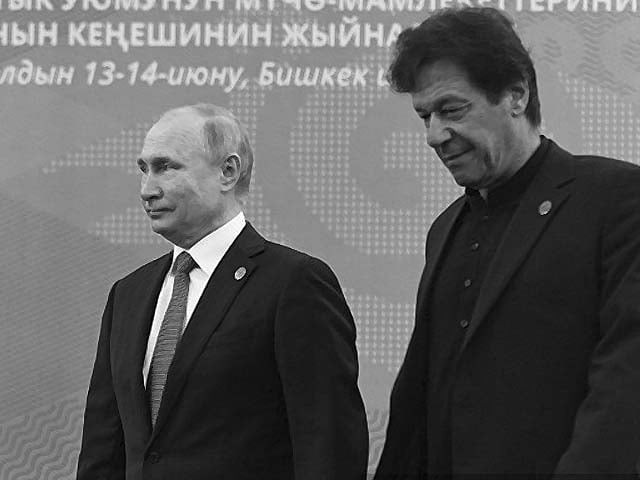Last month’s agreement to begin construction next summer of the Pakistan Stream Gas Pipeline – formerly referred to as the North-South Gas Pipeline – shows that Russia is raising its stakes in South Asia. It represents the evolution of its fast-moving rapprochement with Pakistan and gradual movement towards an eventual strategic partnership. The “military diplomacy” between the two which first began due to shared security threats stemming from ISIS’ presence in Afghanistan and then laid the basis for February’s planned multilateral AMAN-2021 naval drills is now transforming into “energy diplomacy”.
Moscow is visibly diversifying its regional interests by progressively engaging in mutually beneficial forms of cooperation with Islamabad, which can’t help but draw New Delhi’s attention. The Russian-Indian Strategic Partnership is being tested like never before after influential BJP ideologue Subramanian Swamy’s hateful anti-Russian article last month exposed the ruling party’s split over whether or not to retain their country’s decades-long privileged relationship with Moscow. India’s unofficial response to Russian Foreign Minister Lavrov’s warning about American influence in New Delhi might have even inadvertently worsened growing distrust.
It’s against this backdrop that next summer’s planned construction of the Pakistan Stream Gas Pipeline begins to take on a much more strategic significance than most observers might have initially thought. It’s one thing for Russia and Pakistan to stage annual anti-terrorist drills in each other’s countries, as well as participate in multilateral naval drills, and another entirely to invest so significantly in a multibillion-dollar energy infrastructure project. Russia is sending the message that it won’t be deterred by India from establishing tangible stakes in Pakistan’s stability and helping it meet its pressing energy needs.
This is the largest Russian investment in Pakistan since the Pakistan Steel Mills project in the middle of the Old Cold War, which was initiated during a thaw in their relations at the time. Unlike then, however, no realistic chances for a geopolitical competition between the two exist anymore since they’re nowadays on the same page regarding Afghanistan, to say nothing of the USSR’s dissolution totally changing Moscow’s strategic calculus towards the region. This observation results in optimistic predictions about the future of their fledgling partnership since even more investments might soon be on the way.
Publicly financed Russian international media outlet RT reported a little over a year ago on 9 December 2019 that “Russia looks to invest in Pakistan in a big way” after a 64-member delegation led by Russian Minister of Industry and Trade Denis Manturov “inked their largest-ever cooperation deal, worth billions of dollars, to expand trade and business...It includes huge investments in energy, rail and steel industries.” The publicly disclosed details are scarce but the outlet did reveal that Russia promised to invest a whopping $14 billion in Pakistan’s energy sector, only $2.5 billion of which is for Pakistan Stream.
This very strongly suggests that the recently agreed project might be but the first in a series of similar megaprojects all throughout the country over the next decade, which would align with both countries’ complementary balancing strategies vis-a-vis one another. Russia can also show India that it has regional alternatives to that country in the event that New Delhi replaces Moscow’s presence in certain spheres with its Western competitors instead. To be clear, Pakistan is not a replacement for India, but is perceived by Russia as a complementary component of its comprehensive South Asian balancing strategy.
Unlike India which dishonestly claims to be “multi-aligning” in order to unconvincingly disguise its pro-Western pivot that it’s carrying out at China’s – and increasingly also Russia’s – expense, Russia is truly embodying that principle by not doing anything which genuinely harms Indian interests. While it’s true that the American-influenced zero-sum mind-set currently prevalent in that country would prefer for Pakistan to never meet its ever-growing energy needs, let alone from Russia, the multipolar-influenced win-win one that India pretends to embrace while engaging with BRICS and the SCO should praise Russia for helping Pakistan in this manner.
Officially speaking and overlooking Swamy’s hateful anti-Russian article, the Indian government regularly reaffirms how much it “trusts” Russia so there shouldn't be any problem with it engaging in an apolitical non-military investment such as the Pakistan Stream Gas Pipeline. The regional impact of this megaproject’s successful completion will actually strengthen South Asian stability by improving the lives of tens of millions of average Pakistanis in contrast to the regional impact of India’s de-facto pro-American military alliance through the Quad which stands to upset the regional balance of power with potentially devastating consequences.
Nevertheless, it’s understandable that the Indian leadership might feel uncomfortable about this project since they hitherto assumed that they had Russia wrapped around their finger so much that Moscow wouldn’t ever dare to do anything to improve the lives of average Pakistanis, yet the Eurasian Great Power is showing the aspiring South Asian hegemon that it truly practices an independent regional strategy. While the Russian-Indian Strategic Partnership is among Moscow’s most important bilateral relationships anywhere in the world and in fact even in its millennium-long history, the country won’t allow it to be exploited to impede its regional aims.
Those said aims are to restore a semblance of balance to South Asia after India’s de-facto military alliance with the US radically changed the status quo. Russia’s balancing act will naturally be imperfect since it doesn’t aspire to replace India with Pakistan which is unrealistic in any case, but it’ll still be important enough to simultaneously show New Delhi that it can’t boss Moscow around any longer while also signalling to Islamabad that it can count on the country for further investments. Russia won’t ever officially participate in CPEC in order to avoid “provoking” India, but megaprojects like Pakistan Stream represent its growing unofficial role in it.
The more tangible stakes that Russia obtains in South Asian countries other than India, be they Pakistan or whichever others might soon follow, the more diversified and therefore independent its regional strategy can become. This might ultimately lead to Russia no longer playing second fiddle to India in South Asia but actually becoming an equal player in its own right after showing that it doesn’t depend on New Delhi for relevance. It’ll of course take time for this strategic outcome to unfold and there are veritably several variables that could offset its success, but the prospects are still real promising and could thus revolutionise regional affairs.



COMMENTS
Comments are moderated and generally will be posted if they are on-topic and not abusive.
For more information, please see our Comments FAQ